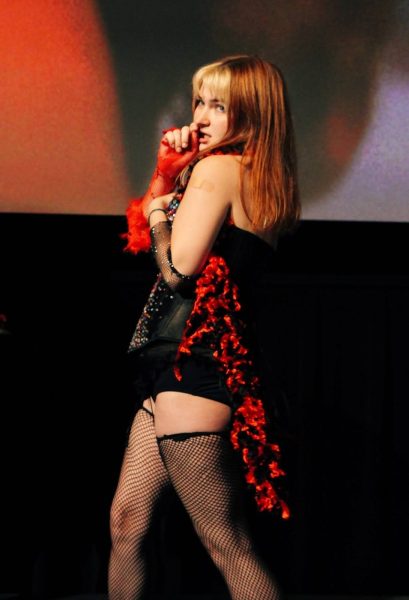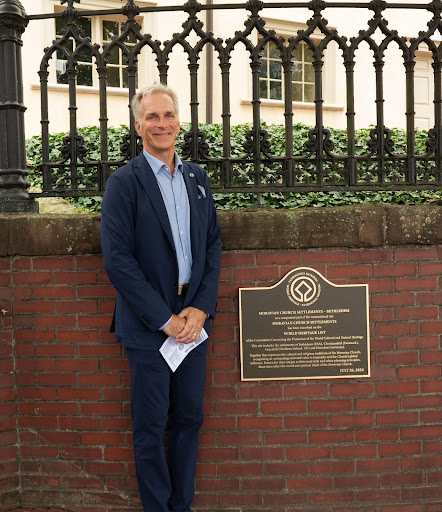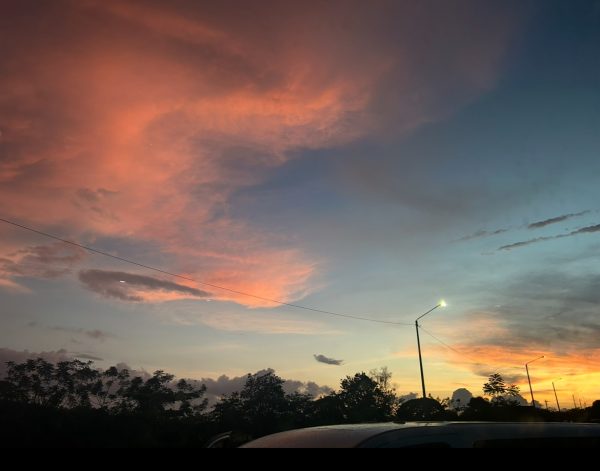A Sense of Place: “Reading” the Moravian Book Shop

The South Campus of Moravian is a hidden gem within the City of Bethlehem and unique from the north campus.
To better appreciate that fact, I decided to take up residence outside of the Moravian Book Shop on Main Street. Armed with my coffee, I stationed myself on the cold and unyielding wooden bench situated in front of the Book Shop, affording me a clear view of Main Street and its inhabitants. The wooden slats of the bench, wet from the rain and not tailored to the human body, caused me to retreat into the hood of my jacket and hunch over my coffee. As I gripped my coffee cup tightly, appreciating its warmth and pumpkin spice aroma, I was reminded that fall has arrived.
Turning my neck against the cold, I surveyed my surroundings. My attention was immediately drawn to the Moravian Book Shop adjacent to the inlaid brick sidewalk that lined portions of Main Street. The bricks utilized in the construction of the sidewalk conformed with the history of the town, as bricks were once used to pave sidewalks before the advent of concrete.
 The gray numbers affixed to the building below the name of the Book Shop revealed that it was built and became a “place” in 1745, four years after Bethlehem’s founding. By being bordered by the sidewalk, great foot traffic inevitably passed by the storefront every day. Various books, games, and Moravian University paraphernalia could be seen lining shelves through the windows, despite the fact that the store was dark inside as a result of the early morning hour.
The gray numbers affixed to the building below the name of the Book Shop revealed that it was built and became a “place” in 1745, four years after Bethlehem’s founding. By being bordered by the sidewalk, great foot traffic inevitably passed by the storefront every day. Various books, games, and Moravian University paraphernalia could be seen lining shelves through the windows, despite the fact that the store was dark inside as a result of the early morning hour.
During the holiday seasons, such as Halloween and Christmas, the Moravian Book Shop’s culture adapts through its current seasonal offering, as the employees decorate the display windows with the appropriate holiday decor of the time. For Halloween and the fall, spooky children’s books are prominently arranged, many of which depict pumpkins and ghosts. Children of all ages are attracted by these colorful and festive displays, causing them to convince their families to enter the premises in hopes of obtaining one of many offerings of the Book Shop.
The Moravian Book Shop occupies its comfortable spot on Main Street, but the Shop is more than a mere space: it is a space that generations of residents have imbued with meaning and affection, turning it into a living, vital place. Of course, a place does not have to be imputed the same meaning by everyone. In fact, one discourse community — which is a group of people who share common ideologies, goals, values, and beliefs — often derives and assigns different meanings to a place than would a different discourse community. Indeed, often spaces are designed with one purpose in mind or to encourage a specific type of interaction but in reality are used for an entirely different purpose to suit the needs of a particular discourse community.
By studying South Campus and Main Street, I came to better understand those spaces and the discourse communities that elevate them into places.
Halloween Ghost Tours is one way that happens. These tours are marketed to visitors of Bethlehem and act as a means of converting the entirety of the Main Street area from a space to a “place” through the imparting of facts about Bethlehem’s rich history and the folklore surrounding it. This informal verbal genre is conferred by the tour guides who are subcontractors of the Moravian Book Shop.
 The Moravian Book Shop is the oldest continuously operating bookstore in the world. This designation did not occur by happenstance. It is the result of the concerted efforts of various discourse communities, such as the Book Shop owners, the City of Bethlehem, and Moravian University, among others.
The Moravian Book Shop is the oldest continuously operating bookstore in the world. This designation did not occur by happenstance. It is the result of the concerted efforts of various discourse communities, such as the Book Shop owners, the City of Bethlehem, and Moravian University, among others.
The impetus behind the rigorous effort to preserve the Moravian Book Shop was more than simply to protect the space that this establishment sits upon. Indeed, the owners of the Moravian Book Shop were cognizant that the Moravian Book Shop reflected the identity of the historic Moravians and the local Bethlehem discourse communities, both of which are deeply intertwined with themselves and the history of Bethlehem.
For this reason, when Moravian College took ownership of this historic Book Shop on June 19, 2018, only the physical “space” was purchased. Originally, the Moravian Book Shop became a “place” almost 300 years ago, when the Moravians utilized the space to spread the genres of writings of their discourse community at the time by importing religious texts and publications.
In addition to selling religious writings, the Book Shop then served as a general store to provide necessary items to build and sustain the Moravian settlement discourse community. The abstract idea of “place” cannot be sold or purchased but simply evolves over time under the guardianship of the legal possessor(s) of the property. As a result of outlasting generations of owners, the sale of the Moravian Book Shop should be viewed more as a stewardship transaction rather than a real estate conveyance.
Realizing that the “place” had intrinsic value and meant a great deal to many different discourse communities, then-Moravian College took great efforts to preserve the legacy of the previous discourse communities. As such, Moravian College strived to retain the current employees and merely changed the color of the exterior facade of the building from classic brown brick to a painted white brick, along with blue trim to reflect the colors of the College.
Nowadays, while the Book Shop retains many of its previous genres of writings (books/textbooks/papers), it has expanded to include a variety of other genres that cater to the contemporary discourse communities, such as Moravian University students (including myself) and families.
For example, the Moravian Book Shop offers textbooks – genres for each discourse community (i.e., nursing, art, biology, and chemistry) that are embedded within the larger Moravian University discourse community. Students utilize the Book Shop to purchase their required genres for their specific “school-designated” discourse community, as well as their first-year required book, Elif Shafak’s “The Island of Missing Trees,” which effectively united the freshmen as a discourse community before they even physically interacted with each other on campus.
The employees of the Book Shop maintain the workings of the establishment, as well as impart knowledge to new members of their own discourse community, in addition to the Moravian students and other customers.






